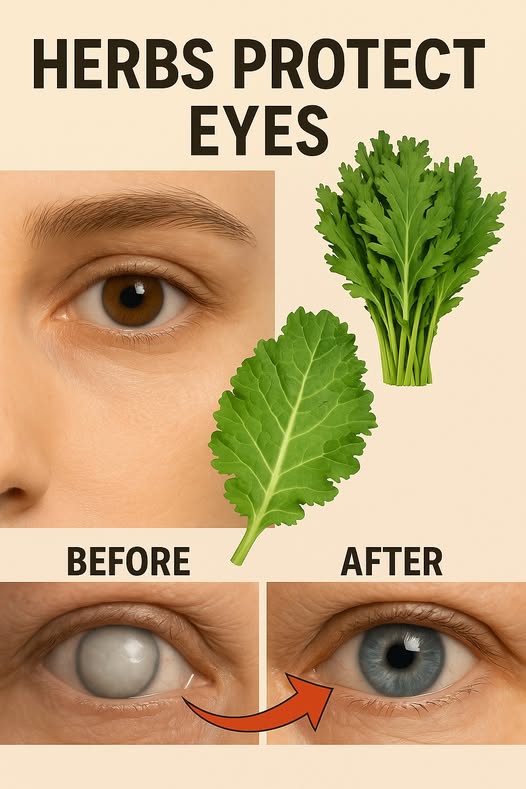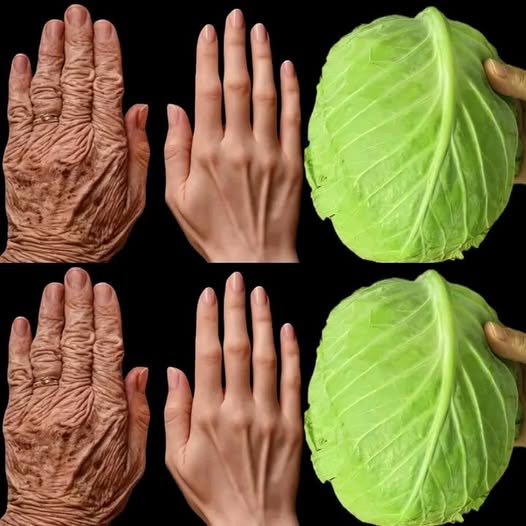👁️ Introduction: Why Your Eyes Deserve Nature’s Best

In today’s fast-paced, screen-dominated world, eye health is deteriorating faster than ever. With over 2.2 billion people globally experiencing vision impairment or blindness, protecting our eyes is no longer optional—it’s essential.
What if the solution to clearer vision, reduced dryness, and long-term eye vitality was growing in your backyard or sitting on your kitchen shelf? That’s right—medicinal leaves have been used for centuries in Ayurveda, Traditional Chinese Medicine, and holistic wellness to naturally boost visual performance, fight inflammation, and prevent degenerative eye diseases like macular degeneration and cataracts.
This article explores five miracle leaves you can incorporate into your diet or routine today to enhance your eye health naturally. These aren’t just folk tales—they’re backed by science and real-world results.
🌱 1. Moringa Leaves – “The Vision Vitamin Bomb”
Often called the “Miracle Tree,” Moringa oleifera is a nutritional powerhouse. These small green leaves are packed with eye-supporting nutrients.
Key Benefits:
- Rich in Vitamin A (beta-carotene): Just 100g of moringa leaves provide 6780mcg of beta-carotene—10x more than carrots!
- Antioxidants galore: Contains lutein, zeaxanthin, quercetin, and vitamin C, all essential for protecting the retina from oxidative stress.
- Anti-inflammatory properties: Helps reduce ocular inflammation that leads to dry eye syndrome and retinal damage.
How to Use:
- Add dried moringa powder to your smoothies, soups, or tea.
- Eat fresh moringa leaves in salads or stews.
Pro Tip: Use consistently for 30 days to notice improved visual clarity and reduced dryness.
🌿 2. Curry Leaves – The Indian Secret to Crystal Clear Eyes
A staple in Indian kitchens, curry leaves are more than just flavorful—they’re eye-savers.
Why They’re Effective:
- High in Vitamin A & B2: Vitamin A prevents night blindness; B2 (riboflavin) supports the cornea and lens.
- Powerful antioxidants: Curry leaves fight free radicals responsible for age-related eye decline.
- Improves circulation to the eyes: Boosts blood flow, delivering more nutrients and oxygen.
Usage Ideas:
- Chew 5–10 raw leaves daily on an empty stomach.
- Add fresh leaves to rice, lentils, or tempering oils.
Did You Know? In Ayurveda, curry leaves are often used in eye decoctions to reduce redness and itching.
🍃 3. Bilberry Leaves – Europe’s Answer to Sharper Vision
Bilberries, cousins to blueberries, are famous for improving night vision among WWII fighter pilots. But did you know their leaves also offer therapeutic benefits?
Core Advantages:
- Enhances night vision: Improves retinal pigment regeneration.
- Supports capillary health: Prevents leakage and strengthens tiny eye vessels—vital for diabetics.
- Reduces eye strain: Perfect for those exposed to screens all day.
Ways to Use:
- Brew bilberry leaf tea once daily.
- Mix bilberry extract with your morning juice.
Stat Check: A study in Alternative Medicine Review found bilberry extract to significantly reduce eye fatigue in just 4 weeks.
🌿 4. Spinach Leaves – The Underrated Superfood for Eye Defense
Spinach isn’t just Popeye’s favorite—it’s an eye-health goldmine. It’s rich in carotenoids that our eyes crave.
Why It Works:
- Lutein & Zeaxanthin-rich: These carotenoids filter harmful blue light and protect the macula.
- Loaded with iron: Supports oxygen transport to the eyes, preventing fatigue and dark circles.
- Vitamin K & Folate: Help reduce eye inflammation and fatigue.
How to Add to Your Routine:
- Eat raw spinach in salads.
- Blend with fruits for a green smoothie.
- Lightly sauté to retain nutrients.
Insider Tip: Pair with a healthy fat (like olive oil) for better absorption of carotenoids.
🌿 5. Eyebright (Euphrasia) – Nature’s Built-In Eye Drop
Used in European herbalism since the Middle Ages, Eyebright truly lives up to its name. It’s nature’s own eye tonic.
Benefits That Matter:
- Relieves eye irritation: Soothes itchy, red, watery eyes.
- Combats infections: Natural antibacterial properties help treat conjunctivitis and blepharitis.
- Anti-allergic: Contains compounds that block histamine release, reducing seasonal eye allergies.
How to Use:
- Brew as a tea and use as an eyewash (once cooled).
- Take eyebright extract orally in drops or capsules.
Warning: Always consult an herbalist or doctor before using it as an eyewash.
❓Frequently Asked Questions About Leaf-Based Eye Health Remedies
1. Can eating leaves really improve vision?
Yes. Leaves like moringa, spinach, and curry leaves are nutrient-dense and contain essential vitamins and antioxidants proven to support eye health over time.
2. Are these leaves safe for children and the elderly?
Most are safe in moderate amounts when added to food. However, for concentrated extracts or teas, especially eyebright, consult a healthcare provider first.
3. How long does it take to see results?
Consistency is key. Most people notice subtle improvements in 30–60 days, such as less eye strain, reduced dryness, and sharper vision.
4. Can these leaves replace prescription glasses or treatments?
No. They’re supportive, not curative. These leaves enhance your overall eye health and may slow degeneration, but they don’t reverse conditions like myopia or cataracts.
5. Which leaf is best for computer users and digital eye strain?
Bilberry leaves and spinach are excellent for digital strain. They improve retinal function and help absorb harmful light from screens.
📊 Quick Reference Table: Leaf vs. Benefit
| Leaf | Main Benefit | Key Nutrients |
|---|---|---|
| Moringa | Vision clarity, retinal protection | Vitamin A, Lutein, Vitamin C |
| Curry Leaves | Blood circulation, antioxidant defense | Vitamin A, B2, Iron |
| Bilberry Leaves | Night vision, capillary health | Anthocyanins, Vitamin C |
| Spinach | Blue light defense, fatigue relief | Lutein, Zeaxanthin, Folate |
| Eyebright | Allergy relief, infection protection | Tannins, Flavonoids, Aucubin |
💡 Bonus Tips for Maximizing Leaf-Based Eye Support
- Pair with Omega-3s: Nutrients in leaves work better when combined with omega-3 fatty acids from fish oil or flaxseeds.
- Avoid overcooking: Heat destroys many eye-protecting antioxidants.
- Hydrate well: Your eyes are 98% water—leaves work better when your body is properly hydrated.
- Sleep matters: Natural remedies are most effective when your body gets 7–8 hours of sleep to repair the eyes.
🔍 Final Thoughts: Choose Nature Before It’s Too Late
Vision loss often creeps in slowly—so slowly that we don’t notice it until it’s irreversible. But you have a chance today to make a change. By incorporating these 5 essential leaves, you’re not just feeding your eyes, you’re fortifying your future.
It’s never too early—or too late—to start caring for your eyesight. Nature has given us everything we need, and these leaves are proof of that timeless wisdom.


